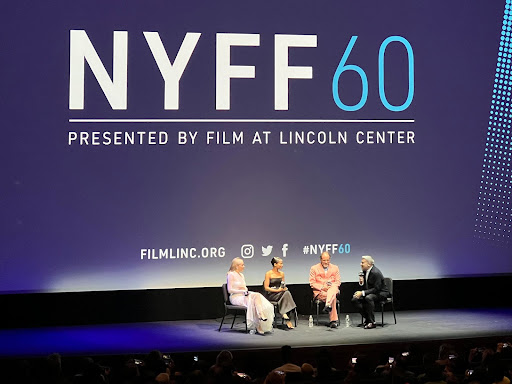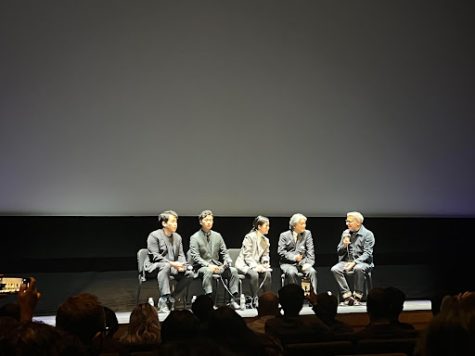NYFF Roundup: ‘Bones and All’ and ‘Decision to Leave’
The New York Film Festival brings us two of the best films of the year

The New York Film Festival’s “Bones and All” and “Decision to Leave” are both exquisite.
October 20, 2022
As a film aficionado, I have dreamed about attending the New York Film Festival. After enrolling in Fordham and realizing the festival was hosted at a theater right across the street from me, I jumped at the opportunity. I was able to secure tickets for two of my most anticipated films of the year: “Bones and All,” which screened on Thursday, Oct. 6, and “Decision to Leave,” which screened on Saturday, Oct. 8. Both are exquisite films with thematic similarities that I highly recommend.
“Bones and All” is the latest film from Italian filmmaker Luca Guadagnino and tells the story of Maren (Taylor Russell), a runaway cannibal in search of her long-lost mother. Along the way, she befriends another flesh-hungry boy named Lee, played by Timothée Chalamet in his second collaboration with Guadagnino. Divulging any more plot details would ruin the surprise.
The film entices you with its unconventional premise and expertly juggles a lot of contrasting tones. One could feel the anxiety in the room during the more gruesome sequences and the quiet mesmerization when Guadagnino slowed down and displayed the beautiful vistas of the American West.
The movie has a high-quality script, but it is elevated significantly by its talented cast. Russell has entered the spotlight in the past few years with other coming-of-age films such as 2019’s “Waves,” in which her character was only the focus of the second half. Here, though, she proves her skill as a performer. She wisely never dips too much into melodrama despite the intense situations her character navigates and does not strike one false note as the beating heart of the film.
Chalamet is always fun to watch on screen, and here, he masters the dreamboat/dirtbag persona. The scene of him dancing wildly to KISS’ “Lick it Up” in the home of a man he ate alive is memorable, to say the least.
Mark Rylance irritated me in last year’s “Don’t Look Up” but commits to a truly strange and terrifying role as an older cannibal with a strong sense of smell who mentors Maren in the film. It would not be a cliché to say he disappears into the role. Lastly, Chloë Sevigny, an icon of independent cinema, gives a reliable wordless performance as Maren’s mother in one of the film’s more arresting moments.
Like much of Guadagnino’s past work, the movie deals with an uncomfortable subject matter in an empathetic manner. He does not judge the morally ambiguous characters at the center of the story but briefly places the audience in their shoes. The film acts as a commentary on youth at the margins of society in Reagan-era America and explores family trauma, using cannibalism as a metaphor for the larger issue of genetic mental health. Like Guadagnino’s “Call Me by Your Name,” the movie is likely to inspire heated debate about what his intentions are with representing such a questionable relationship. Those who can meet the film on its artistic level will have a powerful experience.
Next, I saw “Decision to Leave,” the latest thriller from legendary filmmaker Park Chan-wook whose previous film, “The Handmaiden,” wowed me when I watched it earlier this year.
That film delighted in its shocking twists, graphic violence and unrestrained sensuality, but “Decision to Leave” is much more reserved in its approach. It does not have the sprawling and complex historical narrative of “The Handmaiden” or any of its perverse, disturbing moments. Instead, the film features a simple plot, which acts merely as an anchor point for its two main characters.

Park’s films have a habit of making the audience believe the story is going one way and then flipping everything on its head, and “Decision to Leave” is no exception to this pattern.
Starting as a typical gritty detective story and evolving into a twisted romantic comedy, the film plays with different genres. This technique serves the story well, as it follows a detective, Hae-jun (Park Hae-il), who investigates the death of a mountain climber and begins to fall for the wife of the deceased, Seo-rae (Tang Wei), who may or may not be implicated in her husband’s death.
For the majority of the film, the two are in denial of what they want, never acting on their desires for each other because of their divergent paths in life. Somehow, though, their connection only grows stronger once each character’s ulterior motives are exposed. The film then becomes an absurdist elevation of crime thriller tropes as the lovers realize that the only way they can see each other again is if they maintain their roles of enforcer and suspect. The film is structurally split in half between two different locations to emphasize the conflicted nature of the characters.
The film is technically impressive. Cinematographer Ji-yong Kim and editor Kim Sang-bum deserve praise for their work on the film. Seamlessly weaving the audience through several perspectives and points in time and employing unique transitions and overlays, the two create a hallucinatory effect. The facts are so muddled that they start not to matter to the characters anymore. The burden of proof lies only in the gut feelings of the audience. For these reasons, the film takes on a lyrical and introspective quality that I have rarely seen in any crime thriller outside of Alfred Hitchcock’s “Vertigo.” Watching the film on a large screen, it is impossible not to revel at Park’s mastery of the genre and its form.
“Bones and All” and “Decision to Leave” are both films that deal with the darkness of the human condition but find plenty of light and humor within. They are disturbing at times but also deeply moving. In an increasingly safe and saccharine era for film, it is refreshing to find two challenging works of art that still manage to entertain. Independent film is alive and well.












